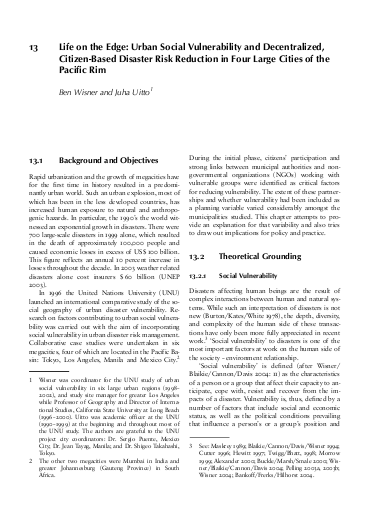
Rapid urbanization and the growth of megacities have for the first time in history resulted in a predominantly urban world. Such an urban explosion, most of which has been in the less developed countries, has increased human exposure to natural and anthropogenic hazards. In particular, the 1990’s the world witnessed an exponential growth in disasters. There were 700 large-scale disasters in 1999 alone, which resulted in the death of approximately 100,000 people and caused economic losses in excess of US $ 100 billion. This figure reflects an annual 10 percent increase in losses throughout the decade. In 2003 weather related disasters alone cost insurers $ 60 billion (UNEP 2003). In 1996 the United Nations University (UNU) launched an international comparative study of the social geography of urban disaster vulnerability. Research on factors contributing to urban social vulnerability was carried out with the aim of incorporating social vulnerability in urban disaster risk management. Collaborative case studies were undertaken in six megacities, four of which are located in the Pacific Basin: Tokyo, Los Angeles, Manila and Mexico City.2 During the initial phase, citizens’ participation and strong links between municipal authorities and nongovernmental organizations (NGOs) working with vulnerable groups were identified as critical factors for reducing vulnerability. The extent of these partnerships and whether vulnerability had been included as a planning variable varied considerably amongst the municipalities studied. This chapter attempts to provide an explanation for that variability and also tries to draw out implications for policy and practice.
Resource collections
- Topics
- UN Habitat - Urban Response Collection
- Urban Response - Urban Crisis Preparedness and Risk Reduction
- Urban Response Collection - Community Engagement and Social Cohesion
- Urban Response Collection - Economic Recovery
- Urban Response Collection - Environment and Climate Change
- Urban Response Collection - Housing, Land and Property
- Urban Response Collection - Urban Crisis Response, Recovery and Reconstruction
- Urban Response Collection - Urban Resilience
